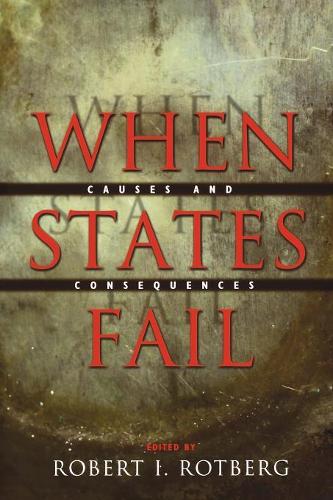
When States Fail: Causes and Consequences
(Paperback)
Publishing Details
When States Fail: Causes and Consequences
By (Author) Robert I. Rotberg
Princeton University Press
Princeton University Press
23rd February 2004
United States
Classifications
Professional and Scholarly
Non Fiction
Constitution: government and the state
Development studies
Development economics and emerging economies
321.05
Physical Properties
Paperback
352
Width 152mm, Height 235mm
482g
Description
Since 1990, more than 10 million people have been killed in the civil wars of failed states, and hundreds of millions more have been deprived of fundamental rights. The threat of terrorism has only heightened the problem posed by failed states. When States Fail is the first book to examine how and why states decay and what, if anything, can be done to prevent them from collapsing. It defines and categorizes strong, weak, failing, and collapsed nation-states according to political, social, and economic criteria. And it offers a comprehensive recipe for their reconstruction. The book comprises fourteen essays by leading scholars and practitioners who help structure this disparate field of research, provide useful empirical descriptions, and offer policy recommendations. Robert Rotberg's substantial opening chapter sets out a theory and taxonomy of state failure. It is followed by two sets of chapters, the first on the nature and correlates of failure, the second on methods of preventing state failure and reconstructing those states that do fail. Economic jump-starting, legal refurbishing, elections, the demobilizing of ex-combatants, and civil society are among the many topics discussed. All of the essays are previously unpublished. In addition to Rotberg, the contributors include David Carment, Christopher Clapham, Nat J. Colletta, Jeffrey Herbst, Nelson Kasfir, Michael T. Klare, Markus Kostner, Terrence Lyons, Jens Meierhenrich, Daniel N. Posner, Susan Rose-Ackerman, Donald R. Snodgrass, Nicolas van de Walle, Jennifer A. Widner, and Ingo Wiederhofer.
Reviews
"Rotberg has collected a cadre of renowned scholars who flesh out the political, economic, and social reasons for state failure and provide prescriptions for both prevention and postfailure resuscitation."--Cameron M. Otopalik, Perspectives on Political Science
Author Bio
Robert I. Rotberg is Director of the Kennedy School of Government's Program on Intrastate Conflict and President of the World Peace Foundation. He is the author of "Ending Autocracy, Enabling Democracy: The Tribulations of Southern Africa" and other books, and the editor of "State Failure and State Weakness in a Time of Terror, Truth v. Justice: The Morality of Truth Commissions" (Princeton), and others.
